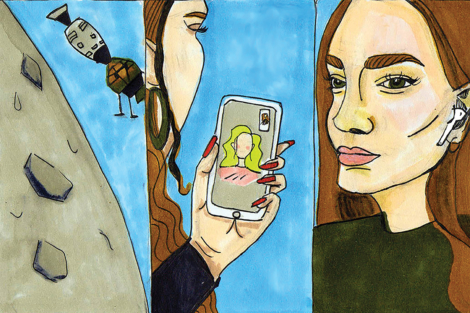Science fiction is worthy of praise. After all, who would have thought that two words with such contrary definitions could be combined to form such a powerful and popular genre?
Science investigates reality through physical and natural observations, experiments, and conceptual theories, whereas fiction writing fabricates events and characters from the imaginary through creative mediums. Science fiction somehow manages to reconcile these two endeavours.
In an interview with The Varsity, Dr. Bart Testa, an associate professor at U of T’s Cinema Studies Institute, explained that it is a “fantasy literature that reduces its fantasy on the basis of speculation with respect to the cosmos or technology.”
When and how did science fiction begin?
“Science fiction began, as we know it, in the nineteenth century during the industrial and technical expansion and innovation,” Testa said. The industrial revolution, which began in the late eighteenth century and continued through the nineteenth century, describes the period when the manufacturing process shifted from the home to the factory.
This shift had increased production scales, product varieties, and the standard of living. However, we cannot have all these ups without some downs, right? Industrialization led to labour-intensive jobs in factories, which in turn frequently resulted in poor working conditions for their employees.
Testa mentioned that “a lot of science fiction writers like to refer back to [the industrial revolution]. They saw the industrial world flourish around them and started to fantasize and speculate about what might happen, and sometimes, these fantasies became real.”
How practical is reading science fiction?
According to Testa, science fiction has always “had a big audience,” and has been very popular among people studying science.
“Perhaps science fiction went into their imaginations — what was possible and what was impossible to do,” Testa continued. He explained that science fiction has helped mould three generations of technicians and scientists.
Consider what Testa mentioned — it’s pretty amazing, isn’t it? The fact that a mere genre of literature has had such a huge impact on the path taken by scientists — to reach the summit of technical advances in the present age — seems unbelievable.
But how did science fiction manage to do so? It cleverly masks real-world issues — be it environmental, ethical, or societal — as problems affecting a different reality. This allows readers to engage with these issues from a new viewpoint, which often results in a deeper understanding of the author’s conception of these challenges.
What, if any, are the limitations of this genre?
From its humble beginnings in inexpensive pulp magazines, science fiction authors had to abide by strict limitations.
“The editors of these magazines, by all records, were dictatorial,” said Testa. “They told writers things they should and must say and shouldn’t and must not do.”
In fact, science fiction was mostly centred around science, big governments, and technology because those editors were usually pro-science, pro-big governments, or pro-military technology, according to Testa.
However, science fiction writers did not allow this tyranny to continue, rebelling against the genre’s norms along the way.
An iconic figure was Isaac Asimov, a science fiction writer and biochemistry professor at Boston University. According to Testa, Asimov was a member of a rebellious science fiction group who believed that pulp magazine editors were too narrow-minded to be invested in literature.
The golden age of science fiction directly followed the publishing of science fiction in paperback. Testa described this age as “the period when limits were, to some degree, removed.”
The golden age mainly focused on broadening the scientific aspect of writing. “Much of what we pick from science fiction comes from that golden period,” said Testa.
Now, moving on from the golden age, science fiction experienced another period of border expansion — one with a decidedly less optimistic take on the future.
Testa exemplified this by referring to a novel written by J. G. Ballard called The Drowned World, which he described as “an apocalyptic novel where the world is covered largely in water.”

Three inventions inspired by science fiction. HANNAH BOONSTRA/THE VARSITY
Science fiction in perspective
All in all, it is clear that science fiction, a genre so impactful on scientists and the advances of the modern world, did not develop in the spur of the moment.
The genre felt various forms of pressure, yet it managed to not only survive them, but also to overcome the obstacles thrown its way. The diligence of writers and readers who stood by this genre and won its freedom allowed them to present the world the true worth of science fiction.


